Greta Van Fleet has achieved a lot, very quickly, for a band of precocious young lads from Frankenmuth, Michigan. Half of the quartet can’t legally get into a bar: identical twins Jake (guitarist) and Josh Kiszka (vocalist) are 22 now, while their younger brother, bassist-keyboardist Sam, turned 19 this year, and drummer Danny Wagner is 18. The latter two graduated high school the same year the band’s two EPs, Black Smoke Rising and From the Fires, were released. The group formed in 2012, when Sam was 12 years old.
Greta Van Fleet exploded onto the charts in 2017 with singles “Highway Tune” and “Safari Song,” which both reached No. 1 on the rock charts and subsequently propelled the band to tour. Soon they were drawing sold-out audiences around the world. When Premier Guitar met up with brothers Jake and Sam in Nashville at Blackbird Studios in February 2018, the band was prepping to share a stage with Sir Elton John, who handpicked them to play at his annual Oscar party. They were also in the middle of tracking their anticipated debut full-length album, Anthem of the Peaceful Army (which will be released on October 19), and already living a dream that many musicians aspire to—with just two EPs under their belts. (As of this writing, the upcoming unreleased album’s first single, “When the Curtain Falls,” had reached No. 5 on Billboard’s rock chart.)
Rock fans have responded to this band’s raw, energetic music in droves, but you can’t discuss Greta Van Fleet’s rise without addressing the elephant in the room: Led Zeppelin. Greta and their sound—from its tight, powerful rhythm section to Jake’s scorching blues-rock riffs to Josh’s howling, almost operatic vocal prowess—have yet to shake the association. But they’re proud of where they came from.
“There are a pretty broad range of influences we grew up with,” says guitarist Jake. “Being a band for this generation, we’re still a product of our environment. I think we’re blatantly making it apparent that these are things that influenced us growing up, and not just Led Zeppelin. It’s the Beatles and the whole of the British Invasion and American roots music and so many other things. But we’re not shy or abased to say that we were influenced by Led Zeppelin. We’re not trying to hide anything.”
The three Kiszka brothers have been banging on instruments since they were out of diapers. The influence of their family—especially their chemist father, Kelly Kiszka, who Sam calls “the best harmonica player I’ve ever heard”—provided the impetus for what they do. “The reason this whole thing exists is because of everyone in the whole family playing music,” Sam says. (The Kiszka brothers also have a sister who sings and plays flute and ukulele.)
Jake, who spent his youth glued to six strings, points to Eric Clapton as one of his earliest influences. He recalls plugging in his Squier as a 7-year-old and playing along with his father’s band while they rehearsed in the next room. “I was quiet enough that they couldn’t hear me, but I would pretend to jam with them,” he remembers.
For Sam, Jack Bruce is the benchmark of bass that he’s always looked up to. “He kind of did what John Entwistle did before John Entwistle,” says Sam. “He brought the bass to the forefront of the music. He played it, and that wowed me. He made bass a lead instrument.”
And so, rock ’n’ roll is in their natural habitat. If some are quick to call their music too familiar, it’s no less genuine. “I think what really sets us apart is the time our music is coming,” Sam says. “Right now, it’s coming at a time when your stereo is not receiving signals of authentic music. And it’s time for that to change. Greta Van Fleet has a chance to bring authentic blues-rock back into the popular scene. We are three brothers and a best friend, we really love each other, we write all of our songs together, and we put power behind our music in this modern scene.”
Months after meeting them in person at the studio, we caught up with the brothers again on the phone as they were in L.A. rehearsing for a short film for Apple Music’s Up Next series. With their careers blasting off and beginning to really rage, Sam and Jake were calm, collected, and thoughtful as they shared details about plugging in for the first time, discovering improvisation, playing with sitars and lap steels at Blackbird, songwriting for Anthem of the Peaceful Army, and the beauty of simplicity they feel is at the heart of rock ’n’ roll. Their debut LP comes after Greta Van Fleet has already, by some measures, “made it” as a band. Something tells us they’re just getting started.
Do you have a specific memory of an “aha” moment with your instrument, where you knew music was what you wanted to do for the rest of your life?
Jake: I think it’s a collective of “aha” moments throughout the period of my life up to this point. I’d always been playing and I always had an acoustic. I was working with my dad to continually upgrade to the next acoustic when I outgrew one, I suppose. But I remember being at my uncle’s house in Michigan and sitting there and my dad would come in every hour and he’d say, “Okay, you need to move from chord A to B. Now do that as fast as you can to transition.” So I’d sit there and just play those chords over and over so that when he walked back in, if I could do it, then he’d show me another chord. It was so easy at that point—I took to it quite well. That was when I was like, “I can do this.” Having played since age 3, and then fiddling around and finding chords of my own and then getting an electric guitar for the first time and plugging in, that was an “aha” moment and total transcending of what I wanted to do. I could translate all the stuff I learned from the acoustic to the electric.
Sam: Yes, it was early on. I was about three to six months in. This is at the point when I’m starting to learn what it really means to play the bass. Bass was my first instrument and at the time was my only thing I was really doing. We were having this jam in the garage like we always used to do … just invited a bunch of buddies over. You know, the classic problem with the group jam session is, you always need a bass player. You have one and it always seems that they run off: Where did they go? It’s like some kind of punishment to have to play bass, and so I’m always doing it. I never get to play keys in the jam session because there’s never any bass players. But anyway, we broke into this 12-bar blues, and I was absolutely wowed by myself when I started improvising. I think that was the first time I proper knew what improvising was. I was 12 or 13. I felt the rhythm surround me, and I felt like I was a part of what was going on. Ever since, that’s what I’ve always felt, but that was like the defining moment of, “am I gonna stick with this?” That was the breakthrough.
Sam, you also play piano and many other instruments. What’s your favorite instrument to play where you feel most free?
Sam: Honestly, the bass is where I feel the most freedom because bass is kind of the last thing that people know they’re listening to. People would notice bass a lot more if it disappeared. That’s kind of where I got my style from. I never really noticed what bass was until my dad started playing out in like, Cream songs, and I was like, whoa. That makes the sound! Its importance cannot be overstated. So, I thought, if I want to be heard I have to do stuff like this. I started playing really hard and I changed the pickups so my bass was hotter. I feel the most freedom when I explore the melodies in a rhythm.
In a recent interview, Robert Plant playfully said of you guys, “They are Led Zeppelin I.” What did you guys think about that?
Jake: I saw that. I think for all of us it’s another of those humbling, honorable moments. When we’re with Elton John or so many others we brush paths with, those individuals are legends we grew up listening to on the radio. To have them talk about us is really inspiring. That re-jolts us, and kind of gives us credibility that what we’re doing isn’t being unseen or unrespected. With the Led Zeppelin comparison, we’re humbled with the references and honored by the affiliation.
Sam: I really don’t know [laughs]. Because even with people like Robert Plant, I try to keep other peoples’ opinions out of the way. That’s just a life thing except when you’re doing this it gets exemplified by a trillion. It’s hard to focus on what the art means anymore when you’re caught up in what people think of you. When you start making music for other people, then you get into a realm where you can turn on the radio and hear that stuff. But to be honest, I would take that as a compliment, because that’s a great, great record.
Sam Kiszka came away from Blackbird Studio with an amp he found in the closet: a Sunn 2000S that studio owner John McBride gave to him. The bassist favors the Sunn over his Fender Bassman and is using it exclusively now, even on tour. Photo by Alysse Gafkjen
You guys have spoken of influences a lot, but one interesting artist that keeps coming up is John Denver. What about his music speaks to you?
Sam: It was a huge factor growing up, you know, our dad and uncle and everybody would play John Denver all the time because it’s freedom music. It interacts with the mind in a way that you are relieved of all earthly duties. I think that’s what music is about, taking you away.
When I’m feeling frazzled or stressed out, I sit down and put myself in that spot and close my eyes and listen to a half-hour of music and when I open my eyes it’s such a shock that I’m back here. It’s like sometimes when you wake up and you don’t know where you are, and then it registers. I think that’s how we experience music—we kind of "come to," eventually. With John Denver it’s his enormous voice, beautiful songwriting, and a jackhammer vibrato. It really captures what music should be.
You mentioned a goal for this album was to expand dynamics and dimensions of your music, and to make a more mature album. What do you feel is the progression going from the From the Fires EP to Anthem of the Peaceful Army?
Jake: I think a lot more happened within that objective than I thought. A lot came from inventing new little voicings and shapes within the solos, so that I started going somewhere else than the blues licks I’ve always played. In doing that, a lot of obscure things happened as far as the guitar goes, you know—licks that don’t really have an identity. That sort of belongs to me now and a lot of that was happening. Mixing different genres together, a lot of experimentation, and a lot of creative freedom. More than I expected to happen throughout creating the album.
Sam: The goal for this album was really to capture what had happened. We’ve grown monstrously. I think that we’ve come to be proper musicians rather than just a couple of kids playing rock ’n’ roll. I think every piece of an artist’s work should be a time piece. You can write something and look back on it a year later and you’re like, “whoa, that’s where I was.” A lot can happen in a year. After hitting the road hard in the past year-and–a-half, a lot of maturity has come out of that, not only in the songwriting, but also in the musicianship. I think there is a lot more mindfulness about where melodies interweave with each other. And the dynamics, like Jake said. Not only the dynamics themselves in the music but the dynamics of an album. Albums are kind of overlooked. We need to get back to that. Creating a great album is a lot harder than writing a great song.
Jake Kiszka’s Gear
Guitars
’61 Gibson Les Paul with two PAF humbuckers
Gibson Custom Shop SG
Custom Coodercaster (built by producer Al Sutton)
Gibson Hummingbird
Gibson J-45
’59 Martin D-28 (studio)
’66 Fender Telecaster from Blackbird Studios (studio)
’65 Gibson ES-335 (studio)
Amps
Marshall Astoria CME
Vox AC30
Bletchley Amplifiers Belchfire 45 through a ’74 Marshall slant with Celestion Greenback 25s
Effects
Electro-Harmonix Holy Grail Reverb
Jext Telez Range Lord
Jext Telez Jext Face
Vox wah
Strings and Picks
D’Addario strings (.010–.046)
Dunlop .60 mm picks
It feels like Anthem of the Peaceful Army is a concept album.
Sam: It is. It kind of dives into roots and beliefs. I think it asks fairly large questions. What are we doing to ourselves? What are we doing to our environment? What are we doing to each other? Why must there be hate? And why must there be greed and evil? I think it simply asks the question of why can’t we all be one? We’re all people. We all look up at the same sky, breathing the same air. We all come from the same place.
Jake: I think it does a good job musically of creating visuals that are rooted in nature. And lyrically we talk about mankind and our fascination with that. There’s also subject matter of evolution on there and summarizing the message we can all get around of love, peace, and unity. And good fun! [Laughs.]
The band did some writing for the album up in the mountains of Chattanooga, Tennessee. Can you share any memories from that experience?
Jake: So, the thing you should know about this place we were at—we didn’t know how isolated it was. It was an hour to the closest town; it was this little cabin on some mountain. We were making jokes like, “It’s definitely 100 percent haunted.” [Laughs.] We went into the basement once and that was the last time any of us stepped foot into the basement. It was a really creepy house.
We started writing around noon, and would end up 12 hours later at midnight having stuff and working on it. At this point we were going to bed at 3 a.m. or something. But I would stay up and mess with mixes and try to get parts together. There was this fireplace that was right behind the drum kit, and I would take breaks to sit by the fire. Everyone else was in bed, but I could hear, very clearly, footsteps walking behind me, and my whole body went cold and I just got goosebumps. I literally thought Sam or Danny or Josh had come downstairs, but I turned around and nothing was there. I would be up until sunrise editing stuff, and I’d have to sit with that and it would continue to happen. At one point, I turned around and said, “Stop. Leave me alone. I’m trying to work.” It stopped and didn’t happen again that night. At one point Danny was inside sleeping in a room far away from the rest of us, while we were outside. He said he could hear a little girl laugh whenever we would tell jokes. It was a very creepy experience, but I think that had some influence on some of the tracks.
Sam: I look back on that experience like one of the most magical in our lives. It was just the four of us for a full week, which is remarkable. We didn’t get into any fights outside of playing, which is incredible also. It kind of set the scene. You drive out of Nashville for about two hours and you see nothing, nothing, nothing, until you see this massive … hey, I would even call it a mountain. And then there was this winding road that went up for about 20 minutes. It kinda goes back to John Denver. It’s freedom, it’s nature. We got up there, to this cabin, and it looks small and kinda raggedy from outside, but we go in and it’s just pure beauty with spiral staircases. You walk out on the massive balcony and see millions, or tens of thousands, or trillions of trees! It was amazing. I have very specific memories of “Age of Man” being written and coming to life there. That’s going to be the first track on the album, and that’s always the place that comes to mind when I hear that song. The cabin was also very, very haunted [laughs].
During his Rig Rundown in early 2018, Jake Kiszka’s beloved 1961 Gibson Les Paul was being held together with gaff tape. Since then, he says he’s had to have major repairs done on the guitar, so the tape is gone. Photo by Alysse Gafkjen
Would you say that you all shared an equal amount of songwriting?
Jake: Yeah, for the most part. Everybody brought in a song, and even if it was someone more than others, all the writing comes together from different perspectives—where Sam is writing the bass part, and Danny is writing the drum part, or Josh with the vocals. It’s always like four parts evenly contributing to that one song.
“Brave New World” has a different guitar sound, especially the solo at the end. Jake, you don’t use a lot of effects, but can you elaborate on what you were doing there?
Jake: I wanted to try new tones for solos and have that really be identified by something unique so that when you hear that solo you instantly know what song or solo it is. I wanted to keep it minimal as far as pedals go and focus on performance with the guitar on the album. But a close friend of our producer, Al Sutton, works with Jext Telez. Bob Ebeling brought in this Jext Telez pedal that was a fuzz face. I plugged it in and it was just this really fuzzy, ripping, crunching sound and it was perfect for this solo. I had it when we were writing in the studio, and I switched it on and played the solo and it worked so well.
Sam Kiszka’s Gear
Basses
Early ’80s Fender P bass body with J neck
2017 Fender American Standard Jazz bass
’65 P bass (belongs to Al Sutton)
’72 Telecaster bass (Blackbird Studio)
Amps
Sunn 200S
2x15 Sunn cab
Fender Super Bassman 300 Pro
Ampeg 8x10 cab
Acme Motown D.I. WB-3
Strings and Picks
D’Addario flatwound strings (.050–.105)
The last song on the album, “Anthem,” sounds like it has some pedal steel on it. Who’s playing that?
Jake: That was a lap steel. Sam tracked some of the first parts, and he kinda brought that in and there was one lying in the studio and we’d always play it. I took the last verse and the solo out.
Sam: I think the track I’m most excited about is “Anthem,” which is kind of a pseudo title track. I don’t think I’ll be getting into the meaning of what it is because it’s very vague. But as far as the writing goes, it was this little gem that was found. We were going through old tracks and deciding what should be on this album. I remember the song was haphazardly written as a substitute for something else. We all sat down in the studio with two acoustic guitars and a lap steel … it was this magical mystery of different things we kept pulling from our past. It’s just so much different from what I think people will expect from us. That’s one of the reasons I’m excited about it.
Are you going to play lap steel on that song live?
Jake: We might. Probably, but we have yet to determine that. I think there’ll be a lot more lap steel on songs to come as well.
Another guitar part that sounds experimental for you is midway through the song “Watching Over.” It has a sitar influence to it. What’s going on there with that tone?
Jake: We were at Blackbird Studio and I was rummaging through the guitar vault that was upstairs and I came across this actual sitar. I started playing around with it, which was really cool, and I’ve since purchased one. But there was a sitar guitar that was even more interesting to me because it was something I was super familiar with—emulating a sitar—and I wanted to use it on the album. It perfectly fit into “Watching Over,” because it has foreign aspects to it.
Sam, you’ve got a really thundering, thumping bass tone on the album. Did you play through any pedals?
Sam: No pedals. It was actually the most incredible amp that nobody’s ever heard of. I pulled this old thing out because it looked cool and it reminded me of what Noel Redding used. It was a Sunn 2000S. These things are not expensive. They’re maybe $1,000 for a 100-watt bass head from the late ’60s or early ’70s. They’re amazing and I’ve been touring with it ever since. I think a lot of people use clean amps just to feel it onstage, but my whole thing about it is you can blend in that tone and it’s the most aggressive-sounding amp I’ve ever heard out of a bass. It’s not overdriven, it’s not gained out, there’s not really a playing advantage you get with it. It’s just beef. It’s mean. It’s aggressive. We blended that into pretty much every single song on the record. My gosh, it was just pure magic to my ears that something could even sound like that.
Was that amp at Blackbird?
Yes, it was like way back in the closet at Blackbird. And John McBride, the owner of the studio, actually gifted it to me and I’m very thankful for that. I traded him with eternal access to any show he ever wants to go to [laughs].
So you’re not using your Bassman on tour now. You’re using the Sunn?
Sam: I’ve got the Bassman up there for a backup, but for now I’m playing the Sunn with a 2x15 Sunn cab that our producer, Al Sutton, had at his studio.
What is your current favorite song that you listen to that isn’t Greta Van Fleet?
Sam: I’ve been listening to a lot of Jim Croce. Some of the music is fun and very silly but some of the songs are the most emotional love songs that I’ve ever heard.
Jake: One of my favorite songs is called “Strangers,” by the Kinks. I’ve been listening to that pretty non-stop recently.
If you could take a lesson or jam with any guitarist, dead or alive, who would it be?
Jake: Eric Clapton. I grew up listening to a lot of Cream and stuff. I have memories of sitting there watching a VCR cassette of a Cream documentary with my dad. Clapton was a really early inspiration of mine.
Sam: Oh fuck. Billy Preston, the Billy Preston. He did keyboards for the Beatles in later years. He had such a massive career. He’s the guy that got me into playing keys. Our great-grandpa’s Hammond organ was in the garage, and it’s the closest thing to a family heirloom that we have. I must’ve been 12 or 13 when I turned it on and, by the will of god, it worked. It hadn’t been punched in 30 years. I wanted to learn the organ parts in the Beatles song “She’s So Heavy.” I thought it was so cool. I didn’t know who was playing it. I thought it was Paul McCartney or something. Later I found out it was Billy Preston.
Someone recently asked me if I think the guitar is dead. What do you think?
Jake: I guess you’d have to define what you mean by dead. I see it as such a part of culture, even before it came to a flourishing point where it exploded. When anything starts to decline it’s often deemed as something that’s dead, but it still exists and it’s still in the hands of many, many players—even many players younger than myself. And me being a younger player, we’re all influenced by each other and I don’t think it’s dead. No [laughs].
Sam said earlier that he thinks great musicians stand apart for exhibiting emotion and truth. How do you know if music is authentic or not, as a listener?
Sam: That’s a fabulous question. I think that when you sit down and listen to a song, that you really feel something that you can’t explain. I think that’s what rock ’n’ roll is: you feel something you can’t explain. You feel elated or you feel genuinely upset or you feel understood. I think that’s authenticity because if you’re singing and playing something that makes you feel something, it’s just natural other people will feel it, too. Sometimes it’s hard to separate out what is emotionally authentic music and what’s not, but I think people instantly know the difference.
Jake: I think that’s really quite evident within the first 5 seconds of listening to something: You either feel if it’s truthful or it’s not. That’s the first thing that becomes offensive to me as someone listening and spending time with music: if you feel like you’re being lied to, if it’s not truthful. People are very quick to source whether it’s truthful or not. You can’t manipulate emotion and you can’t manufacture it either. It’s gotta be pure and it’s gotta be real.
If music had an odor, what would yours smell like?
Sam: Very potent, like sandalwood or incense. Really strong.
Jake: Hmmm, that’s a good one. It smells like freedom. Pine burning maybe.
Can you think of your most surreal moment in the last few years after all the success you’re having?
Jake: One of the top experiences that I’ve had personally was when we were in Quebec City, Canada, and we were opening for the Foo Fighters. There were probably 90,000 or more people. It was an absolute mass of people, a sea—literally you could not see to the back of the people, it went so far that they just vanished. It was sunset and it started pouring instantly in the middle of our set, and everybody in the crowd went absolutely insane.
You could just hear this roar of people and the singing got louder, and you could hear that people were singing the lyrics to our song. I think we were doing “Lover, Leaver (Taker Believer)” and were in the middle of a breakdown just jamming. We could feel the energy and their reaction elevated our performance and we were like, “alright let’s do this, we’re all together in this.” I walked out and started ripping a solo and I could hear the crowd going “Jake! Jake! Jake!” I just went somewhere else that whole performance. That was a really special moment for me. It was amazing.
Did you get nervous performing with Elton John?
Jake: Oh yeah. He’s like the only guy who could do that because we’re pretty easy-going guys.
Sam: I can only think of one other person, who would give me the nerves that Elton John gives me.
Billy Preston?
Sam: [Laughs.] No, Paul McCartney.
Jake: What about Eric Clapton?
Sam: Probably Eric Clapton, too.
YouTube It
Greta Van Fleet jam on “Watching Over,” the second single from their new album, at Pinkpop in the Netherlands in June 2018. The album version of the song features a sitar guitar for the solos, but guitarist Jake Kiszka uses his Les Paul on the live solo starting at 1:28.




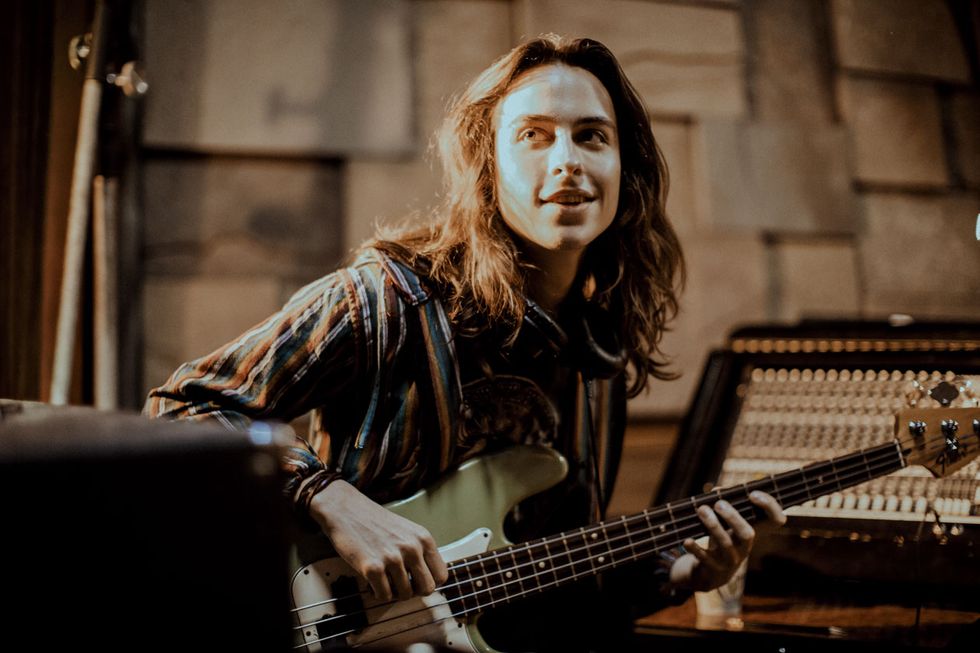
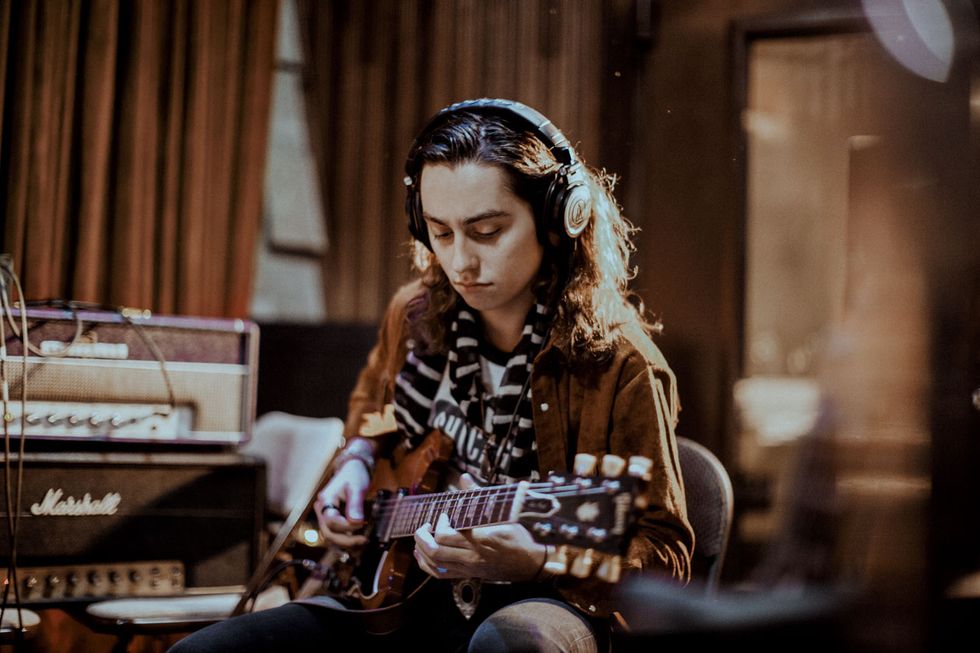




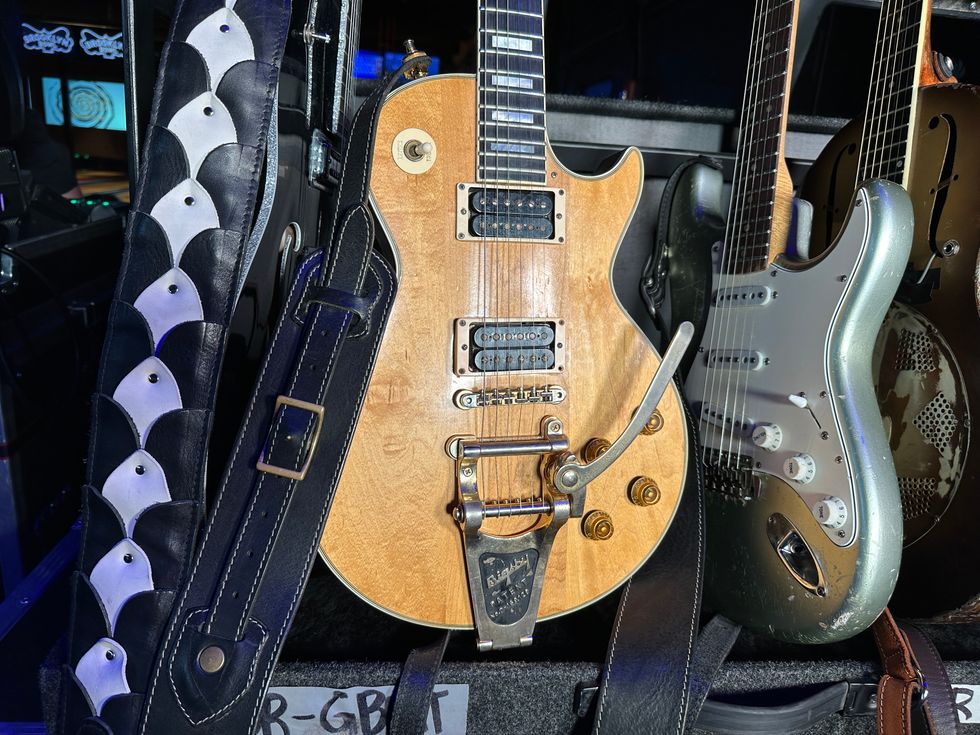
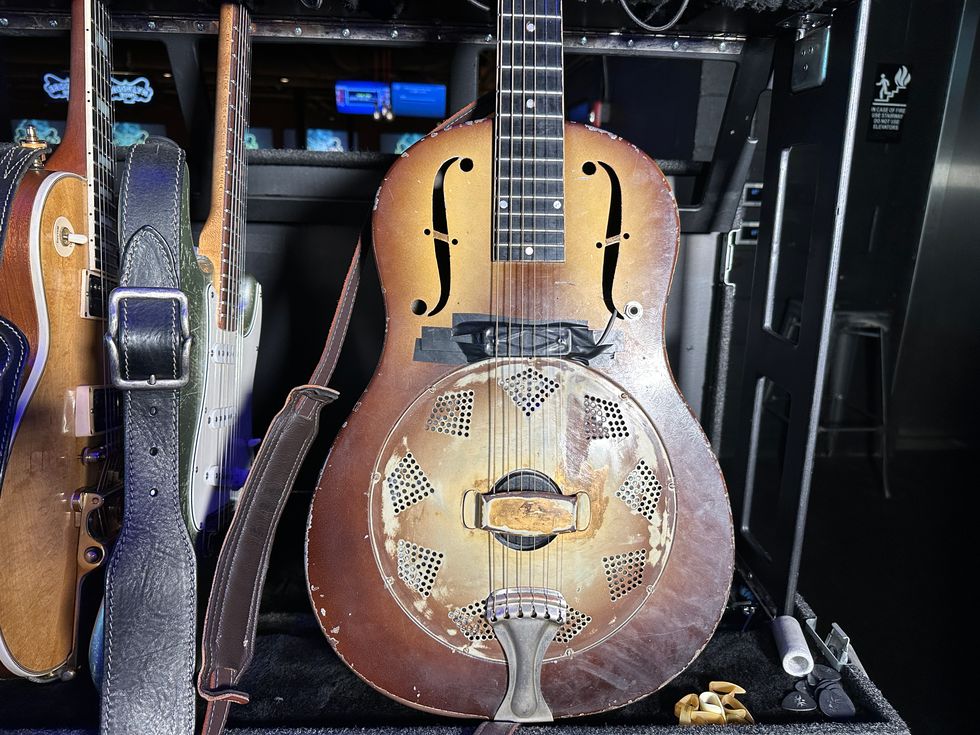
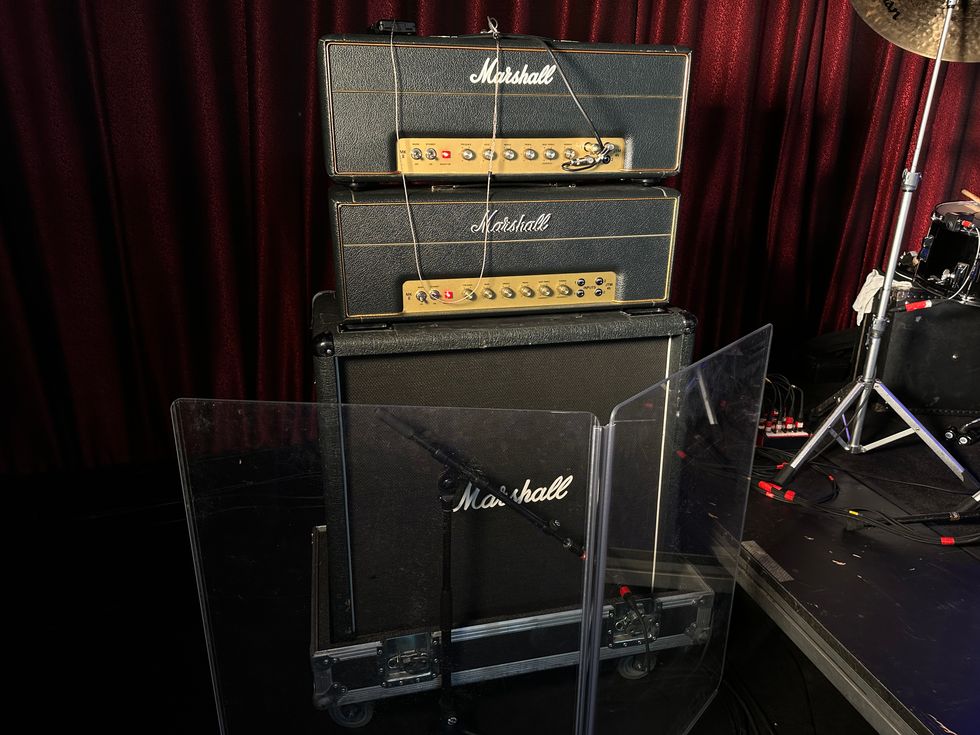
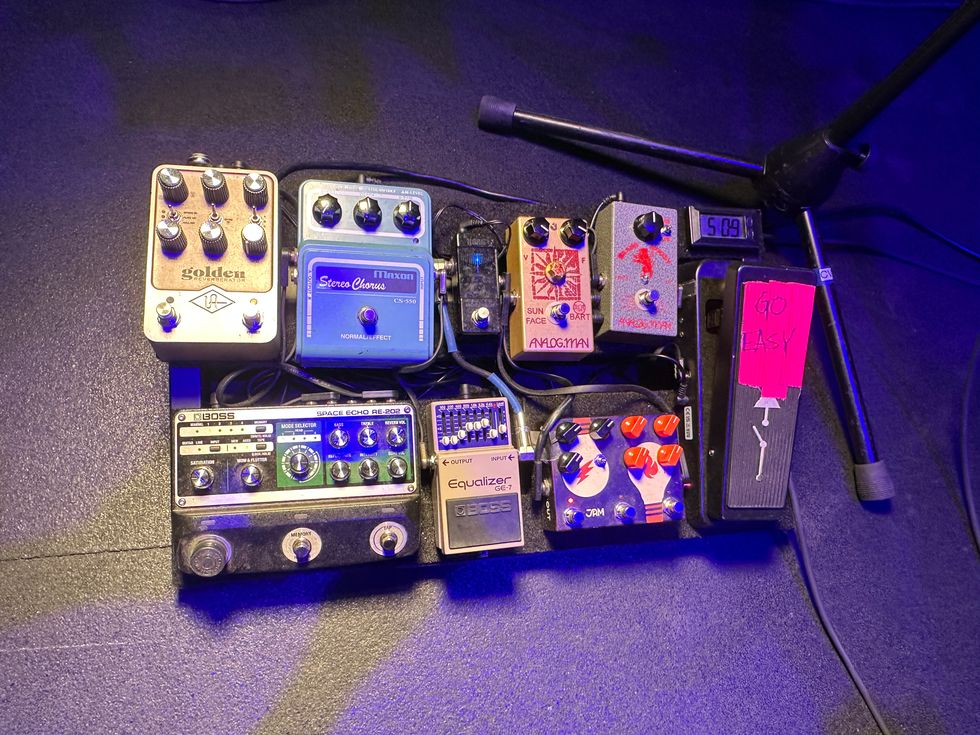
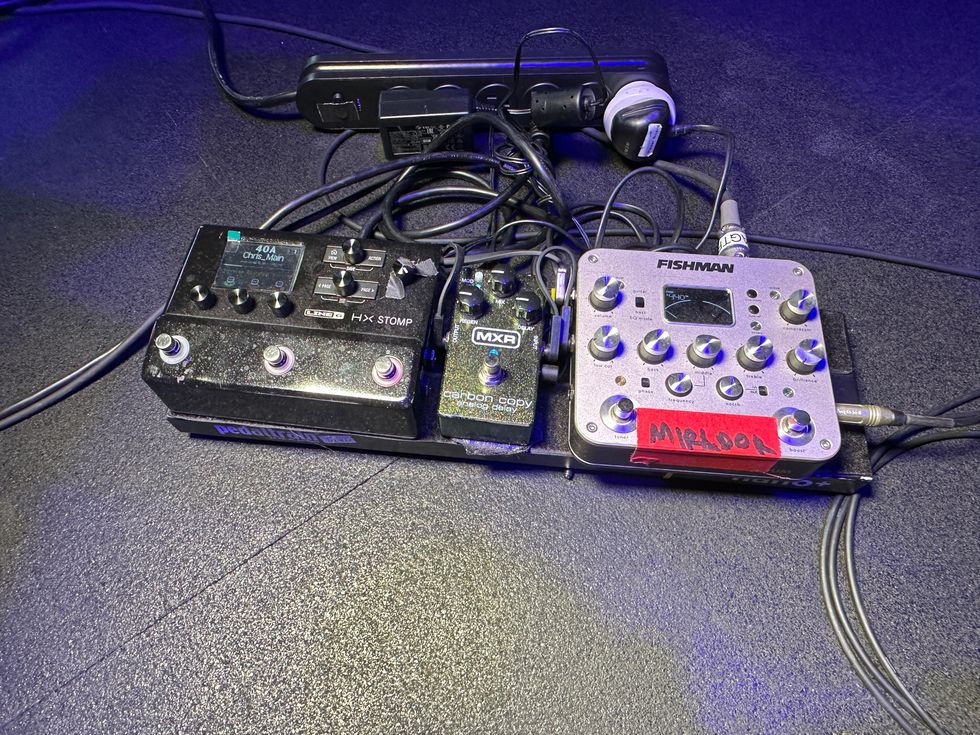
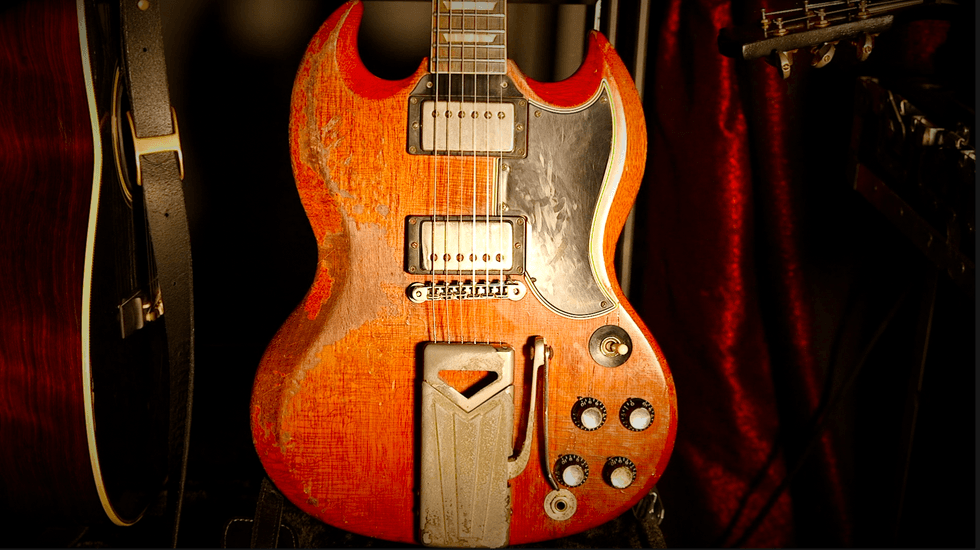
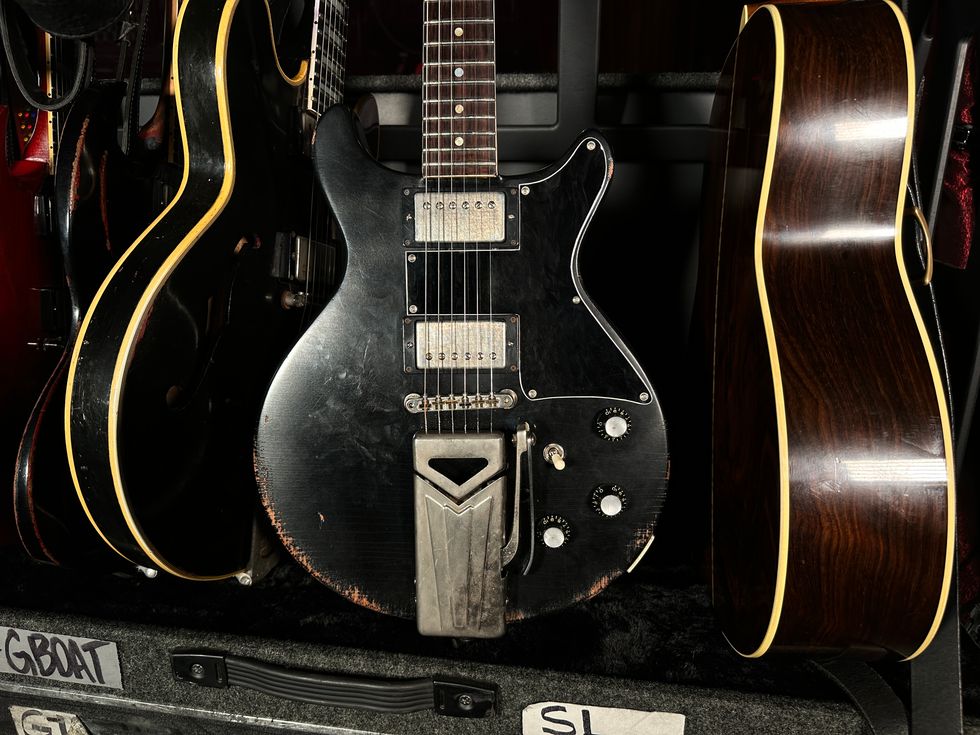
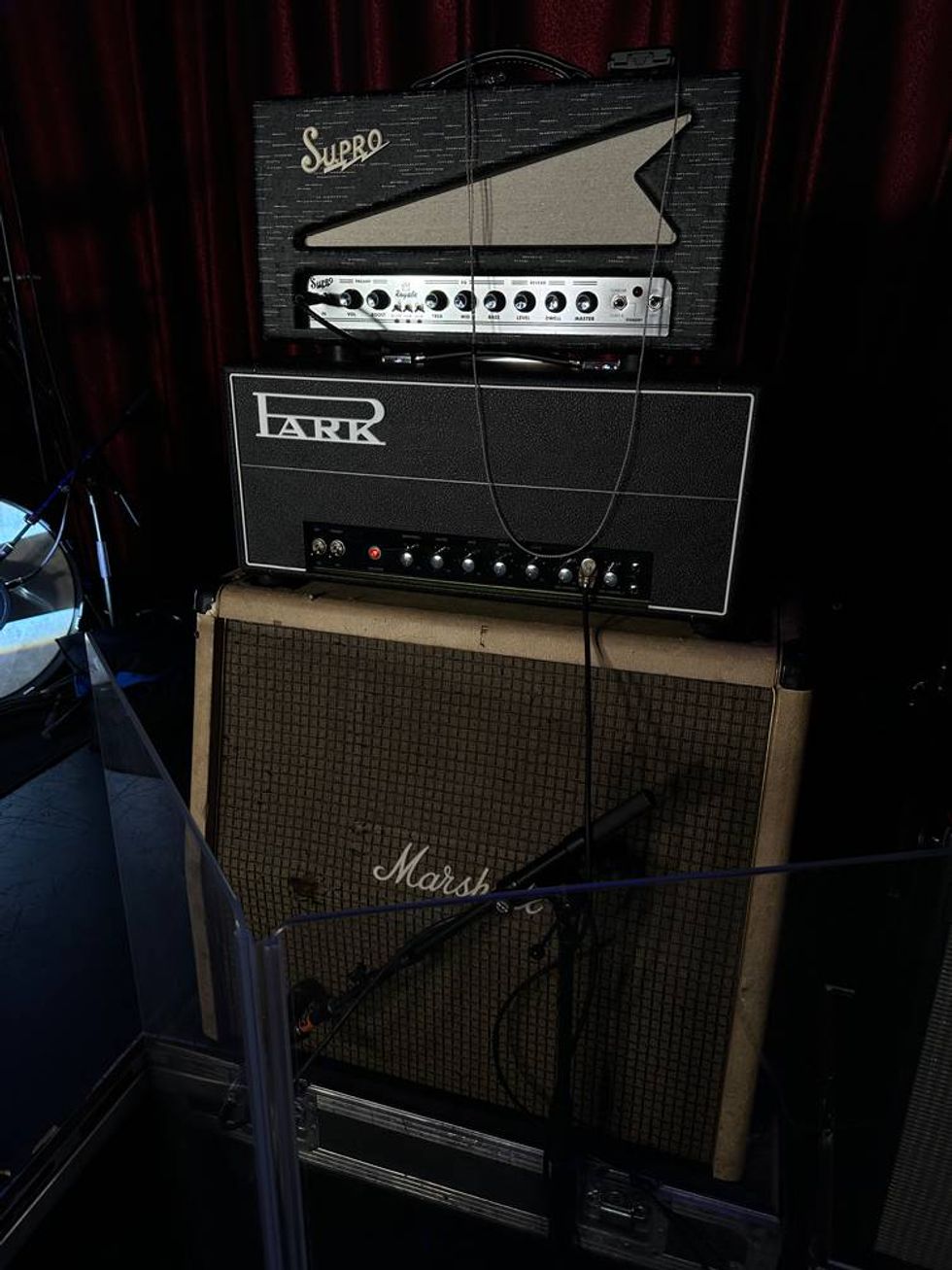
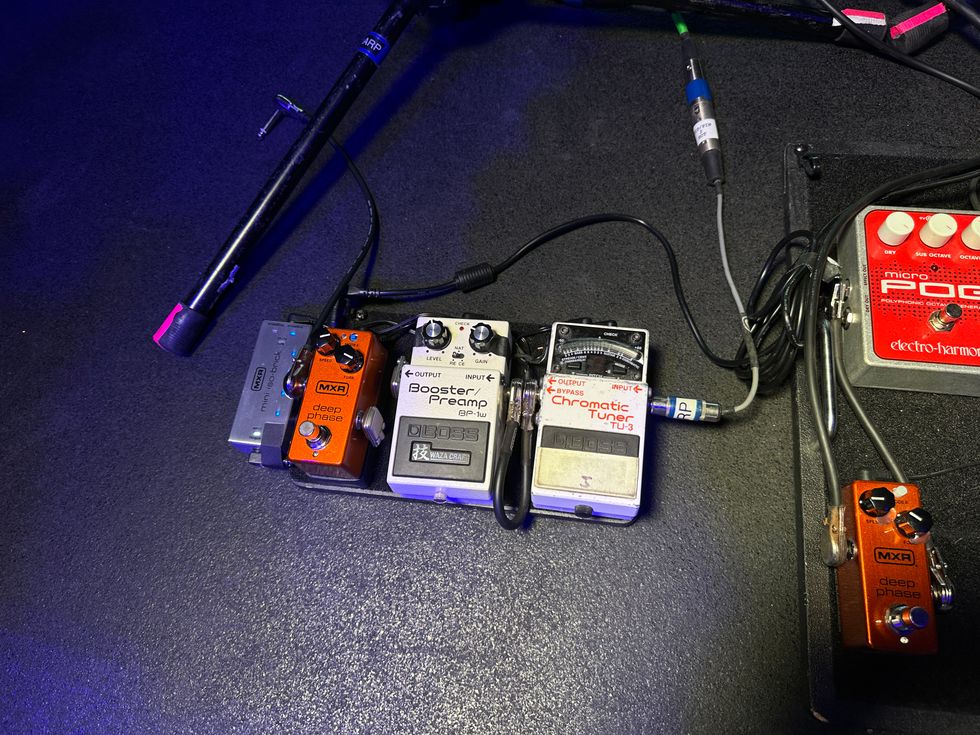
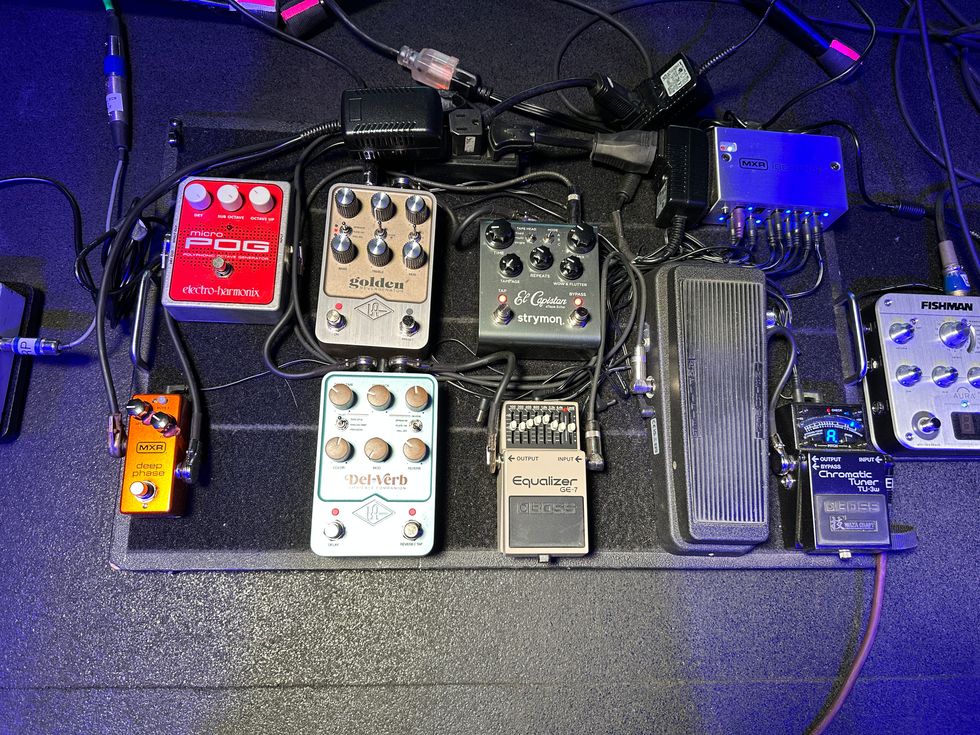
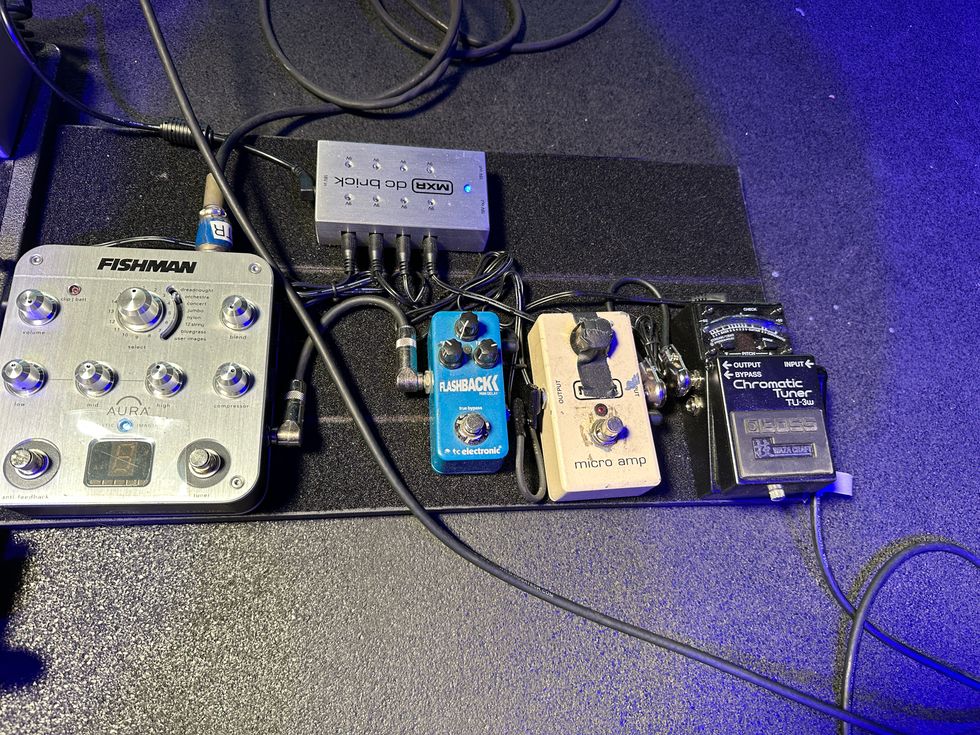

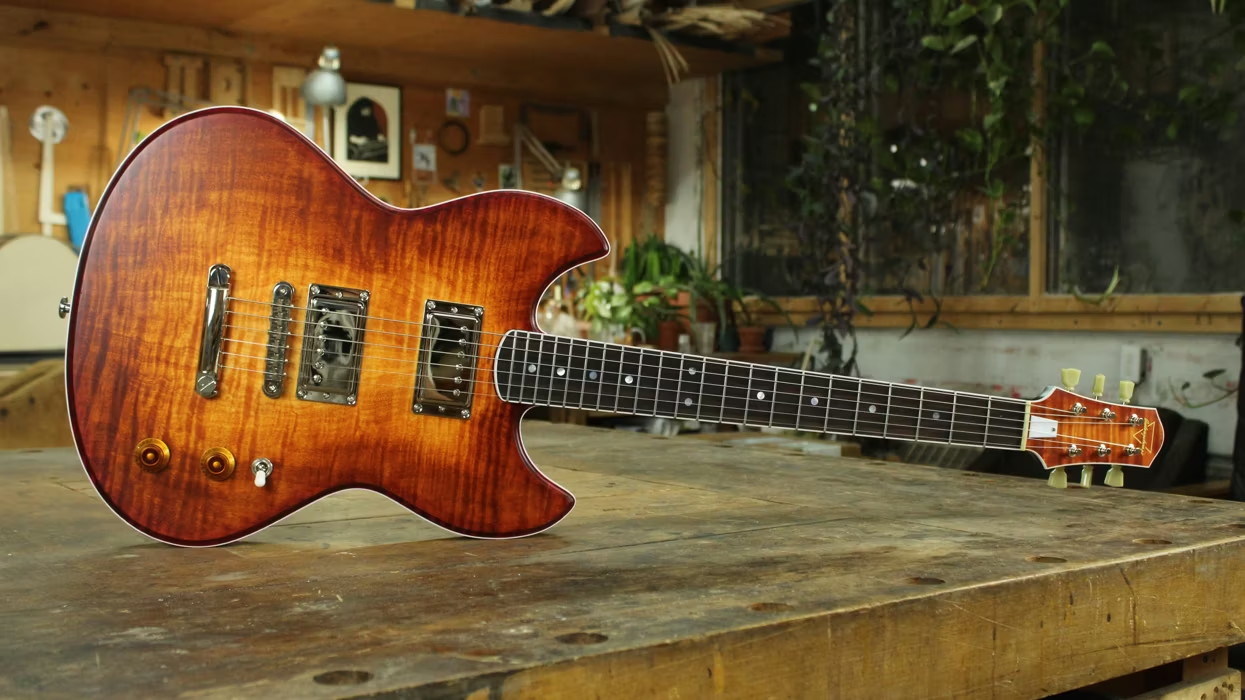
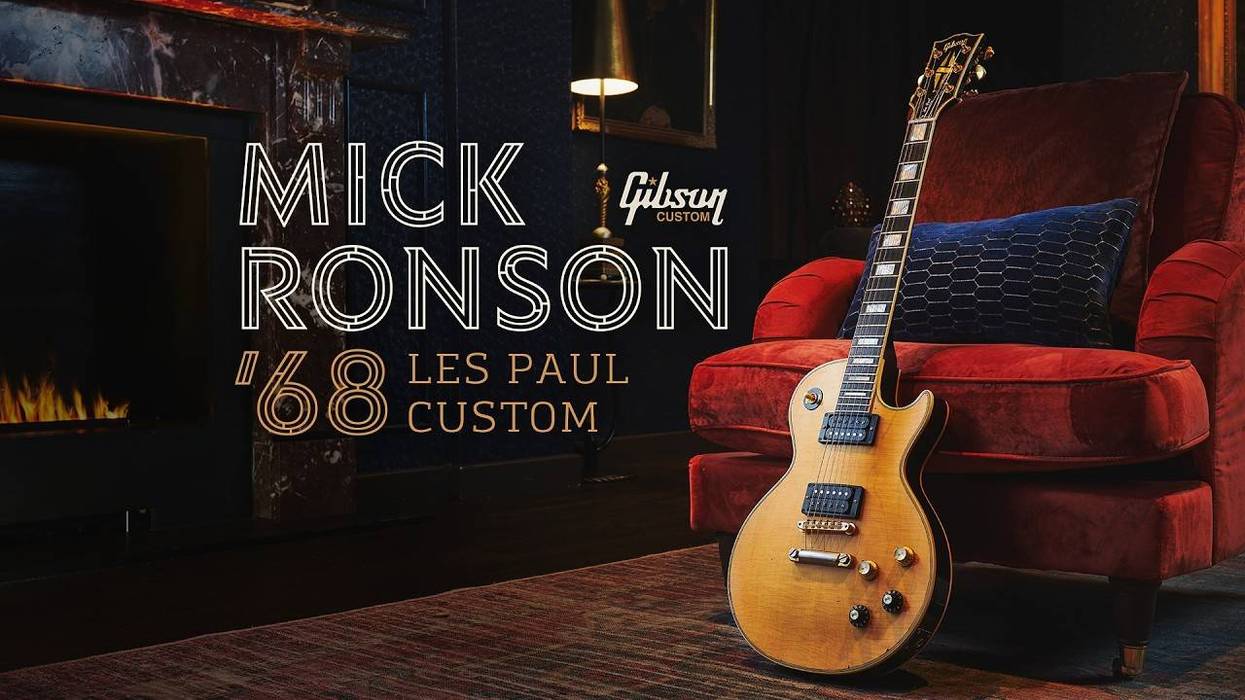
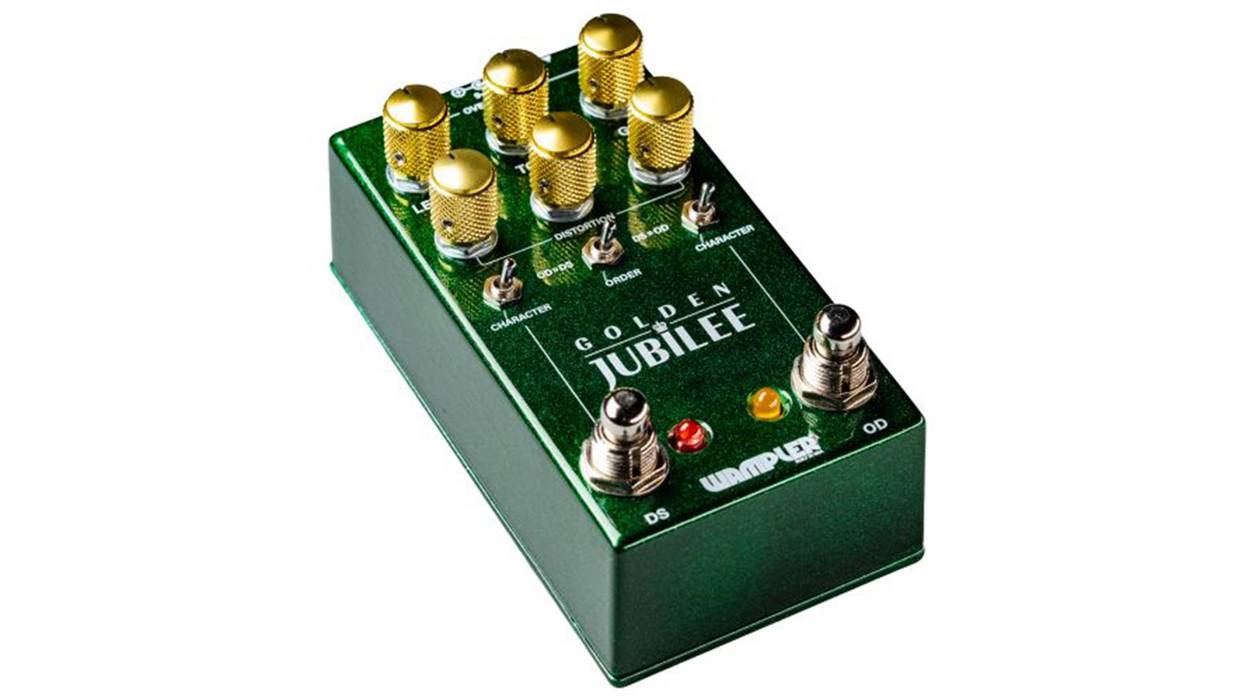

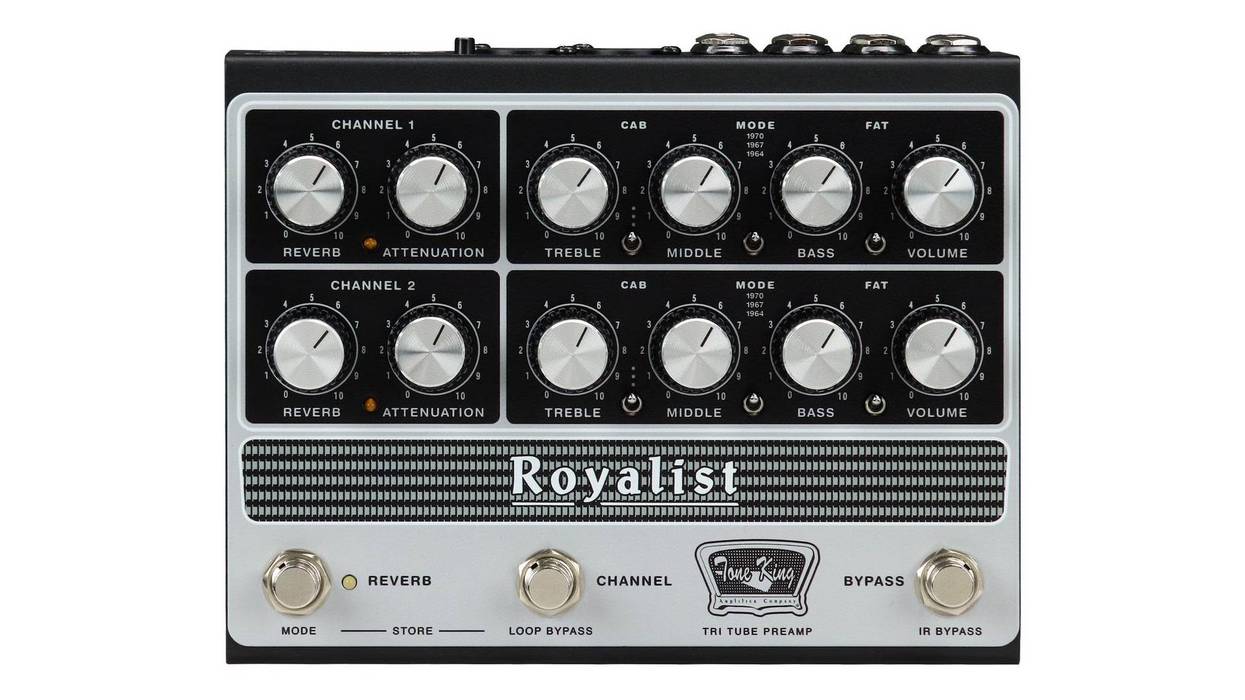
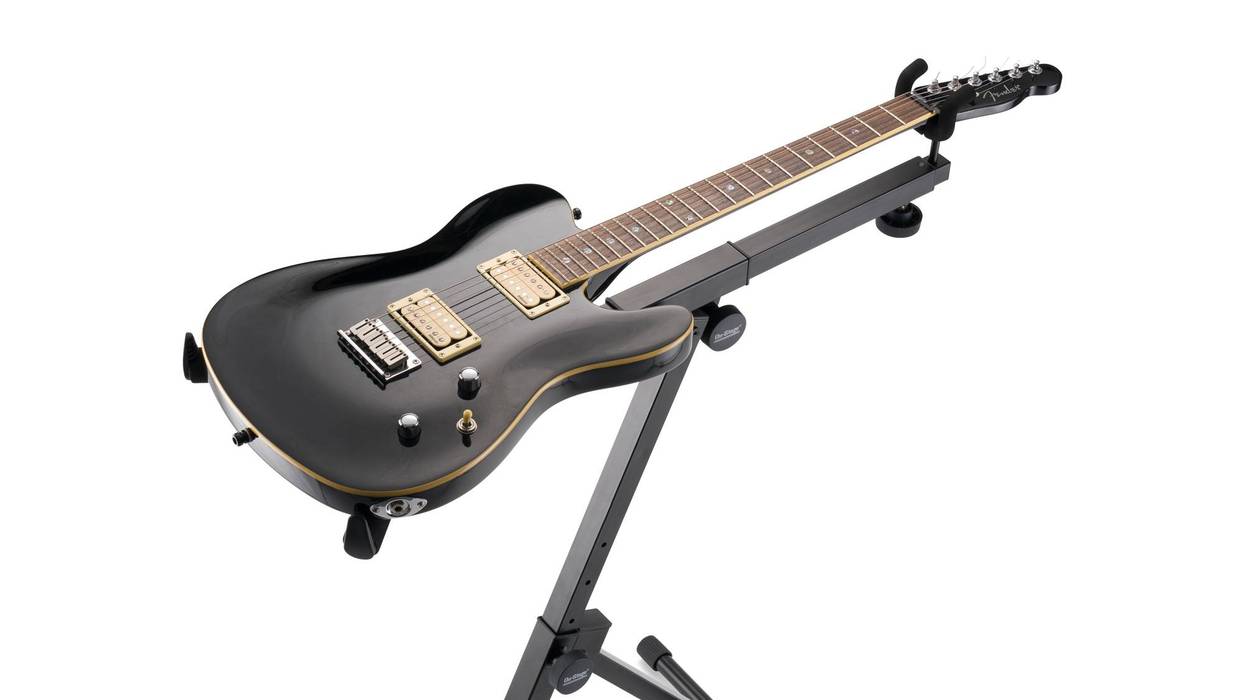




![Rig Rundown: Russian Circles’ Mike Sullivan [2025]](https://www.premierguitar.com/media-library/youtube.jpg?id=62303631&width=1245&height=700&quality=70&coordinates=0%2C0%2C0%2C0)















